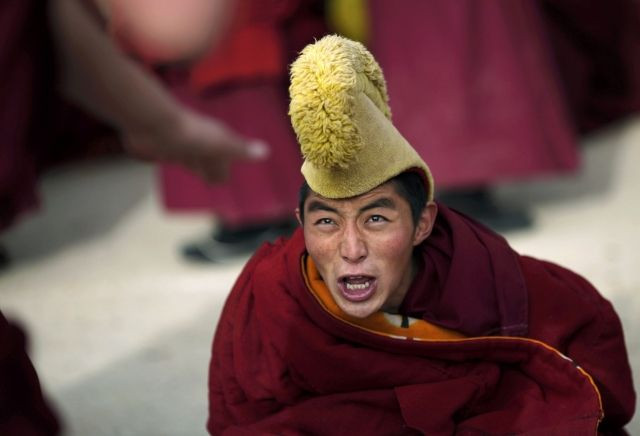China's Fake Monks: Gangs Of Men Use Buddhism To Cheat Tourists

Extortion in China may be expected from some businessmen or politicians, but this weekend two Buddhist temples were shut down after six individuals impersonating monks were arrested for extorting tourists.
According to a report by state-run news agency Xinhua, six people were arrested in Mount Wutai, in Shanxi province, for posing as Buddhist monks and collecting exorbitant amounts of money from tourists.
Mount Wutai, one of the nation’s largest religious sites, is home to about 50 Buddhist temples and a major tourist destination, being part of UNESCO’s World Heritage List. Now, two of those Buddhist temples have been shut down in relation to the fake monk cases.
The Fonguozhongxin temple and the ironically named Temple of the God of Wealth have had their business licenses revoked and are currently being investigated by the Mount Wutai Administration Bureau. According to the report, the six monks were knowingly employed by the two temples to target and collect money from tourists by charging “unreasonable amounts” to buy incense or to watch traditional Buddhist ceremonies.
China’s experience with fake monks is much more widespread than some may imagine. Some may say cheating tourists out of a few extra dollars is not a big deal, and may even be common in especially tourist-heavy areas like Mount Wutai, but the problem of the fake monks is also that they have turned physically dangerous in the past.
In 2010, a face-off between local officials in northern China and a group of over 150 fake monks made national headlines. According to a report by The Guardian, the monks stormed a police station in Baotou city, Inner Mongolia, demanding the release of 31 already detained fake monks. The 31 were involved in a lengthy car chase earlier that week after attacking a toll booth and attempting to escape by bus.
Government officials dispatched 500 officers to control the attack on the police station. The fake monks were determined to be an organized gang of poor migrant workers and farmers who paid organizers for membership in the fake monk "mafia." The group would use their disguise as monks to make money by selling bogus cure-all medicine pastes, and falsely claiming to be from the much-admired Shaolin temple, famous for producing top-tier martial arts athletes.
Some incidents of the Chinese peddling monks have even been reported in Thailand, another Asian country with a significant Buddhist community.
Though tourists may be unsuspecting of fake monks, local authorities are aware of the extortion occurring in the areas where real monks can be found, and plan on keeping a close eye on further suspicious behavior.
“We will continue to regulate temples and shops on Mount Wutai to display a good image to tourists,” the director of the Mount Wutai Administration Bureau said to Xinhua.
© Copyright IBTimes 2024. All rights reserved.






















